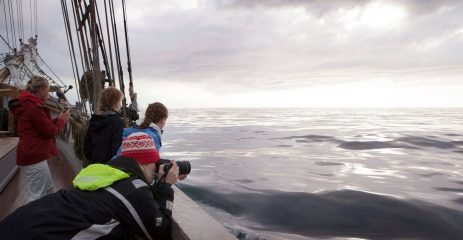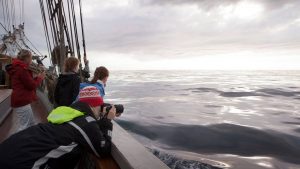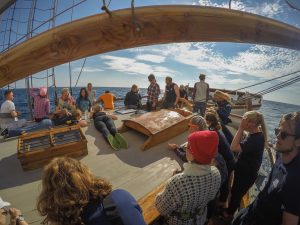By Yujun Xu
University of Edinburgh
• Research suggests that sail-training at sea provides an alternative space for intercultural learning and that the confinement of the ship provides for an opportunity for transformative cultural experiences- but is this the case ?
Enabling generation z to develop intercultural competences and become international citizens with obligations to others can take many forms. The relationship between sail-training, youth and intercultural learning remains an underexplored area both locally and internationally.
This evidenced research blog provides a qualitative insight into the potential of sail-training to be a transformative experience that provides for real educational outcomes in an informal educational setting.
Sail-training, liquid time and generation z
The tall ships are informal educational settings but does sail-training have a special role to play in youth development and intercultural learning? Is it time for a radical rethink about the definition of learning in outdoor spaces and the educative value of learning for youth development in a world that is tense, looking for answers and where better cultural relations between the different people of the world is needed?
Living in a liquid time when everything is on the move and potentially surrounded by diversity, the youth of today and in this case generation Z (born between the mid-1990s and early-2000s) have been significantly influenced by high technology and mobile device based social media in comparison to previous generations.
Tall ship sail-training spaces provide possibilities for experience and collective associations that can combat the often exclusionary effects of traditional educational spaces. The ship at sea can be viewed as a bounded socio-cultural space. The culture potential for inter-cultural learning allows individuals to experience differences in a constructive and empowering way.
Participants of sail-training have an opportunity to reach beyond the everyday social norms that have hitherto constructed and constrained their identities. Tall ship sail-training provides a reflective learning space that can contribute to effective intercultural learning, the breaking down of cultural barriers and the forging of better cultural relations – but are such relationships sustainable and transformative? Listen to some of these voices.
Voices from the sea
Such questions are at the heart of a much bigger study that traces sail-training participants experiences on board and afterwards in order to test what has actually been learned. The four voices presented here are but glimpses of a broader group of sail-training vignettes. Listen to the voices from the sea on certain themes:
- Talking about the natural environment: ‘We have experienced very rough weather, which is always helpful for bringing a group together, having really bad weather, having tough times together in the ocean also makes a difference from other sports’. (Crewmember, I)
- Talking about confined space and limited privacy: ‘We are more isolated than other sports. Here on a ship, you wake up each other using a personal wakey up you hold someone’s bucket. Then you are really close.’ (Crewmember, S)
- Talking about freedom from social media: ‘The social media detox definitely forced people to talk more. A lot of time in social settings, people seek refuge on their phones if they feel uncomfortable. They go to their phones and just look down. I feel that not having access to the internet made it a lot easier for people to avoid doing that. I think it brought up my focus a lot more.’ [Sail trainee, D]
- Talking about teamwork and collaborative experience: ‘I think to experience the power of the group. Being a part of a group is a very good experience to see how the group can work together, how one plus one can be three, and I don’t think that everyone has experienced that. And sailing is a perfect way to experience that.’ [Crewmember, J]
How can we make sense of the voices from the sea: What are they really saying?
From the trainees’ and crewmembers’ points of view, sail-training is different from other sports or educational fields because of the environmental isolation. The isolation led to unique challenges and toughness that brought together the group and drove the group members to help each other and become relatively dependent on one another. This facilitated the trainees’ intercultural learning, understanding and flexibility. To some degree, the 24/7 intensity stimulated the participants’ critical thinking about their intercultural experiences.
Sail-training serves as an alternative education space and for Generation Z to temporarily escape the fluid time of the modern society and create opportunities for them to develop their intercultural understanding, and encourage their experiential engagement and creativity.
Tall ships, internationality and the search for common purpose
The United Nations, especially UNESCO, has been actively supporting and promoting learning and conversations between and within intercultural groups and communities. Regional unions such as the European Union (EU) are also reacting to the contemporary situation and endeavouring to commit to EU exchanges more often for more people. Such a goal if facilitated by Erasmus funding (+) to encourage youth to participate in a wide variety of programmes and activities to reinforce their European identity, as well as facilitate their understandings towards the self and the other.
As yet few initiatives and sources of funding are available to promote experiential exchange and interaction amongst Asian countries and other regions or parts of the world. 2018 saw the Tall Ships fleet sailing to the Pacific Rim for a truly unique race. This regatta marked the first race between the southern Korean Peninsula and the eastern coast of Russia and the fleet was joined by a flotilla of yachts from Chinese Qingdao International Yacht Club. It is suggested Asian countries could use youth development through sports and outdoor activities, including tall ship sailing, as a common purpose to develop more peace-oriented intercultural or exchange projects if not a more peaceful orientated world.
Concluding remark
Sail-training is a unique space in which inter-cultural learning between people and nations can be forged. In a tense and changing world why should this and other opportunities not be grasped in order to facilitate better cultural relations, diplomacy and international understanding?
The evidence presented here supports the idea that sail-training at sea provides an alternative space for intercultural learning and that the confinement of the ship provides for an opportunity for transformative cultural experiences.






